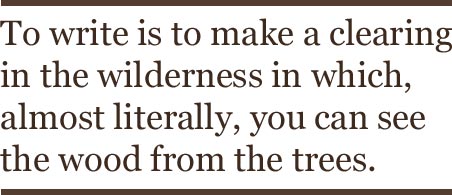To write is to step away from the clamor of the world, to take a deep breath and then, slowly and often with shaking heart, to try to make sense of the bombardment of feelings, impressions, and experiences that every day and lifetime brings. The very act of putting them down—getting them out of the beehive of the head and onto the objective reality of paper—is a form of clarification. And as the words begin to take shape and make pairings across the page, gradually you can see what you thought, or discern a pattern in the random responses, so that finally, if all goes well, you’re convinced you’ve got something out of your system and into a domain where it creates a kind of order. Random experience becomes teaching, cautionary tale, or even blessing.
To write is to make a clearing in the wilderness in which, almost literally, you can see the wood from the trees. In the thick of anything, you hardly know who you are or where you’re going (which is the redeeming power of experience); at your desk, recollecting emotion in tranquility, helped by memory’s editing devices and imagination’s hunger for possibility, you take something that might only have been heartache and turn it into something more provocative, enriching, and even instructive.
 That’s the theory. And it works. I know what I think of many things because I’ve wrestled them into clarity through long, long hours at my desk. I’ve told myself that I’ve made a shape, an argument, out of a barrage of sensations, and now I can tell you where I stand on Thailand, on the late romances of Shakespeare, or Susan, and her infuriating habit of talking about herself.
That’s the theory. And it works. I know what I think of many things because I’ve wrestled them into clarity through long, long hours at my desk. I’ve told myself that I’ve made a shape, an argument, out of a barrage of sensations, and now I can tell you where I stand on Thailand, on the late romances of Shakespeare, or Susan, and her infuriating habit of talking about herself.
But there is a fatal catch in the process that any Buddhist might mournfully savor. The very process of sitting at the desk day after day after day, alone, somewhat removed from the world, one’s eyes literally or metaphorically shut, makes one able to see through (in every sense) the whole process of thinking and concluding, the very construction denoted by “I.” The very fact of trying to explore the mind and its responses, intensely and inwardly, without stepping back, moves one after a while to see that the mind, and the self that talks about the mind, feels no more real than that cloud formation over the mountains, where the sun is beginning to set. To give oneself over to the objective business of writing is to see how subjective the whole business of the self and writing is.
I find that if I spend four weeks, say, on a project, there comes a time, toward the end, when I can no longer take it or myself seriously at all. I’ve seen that what I believe today I can hardly remember tomorrow. The radiance that arises as I contemplate the little epiphanies born in one mood becomes despair in the next. The self that imagines it’s so objectively scrutinizing the passing show of appearances is a passing show itself, as fickle, as impermanent, as the weather outside my window. I draw a definitive conclusion today; tomorrow, when I pick up my papers from the day before, it doesn’t seem real at all.
The Buddha famously spoke of the “jungle of opinions.” To still the mind, he suggested, is to move past layer after layer till you’re in a place where the chatterings of the mind, the jungle of opinions, this contention and that certainty, seem as remote as the hubbub in the street when you’re seated in a church. There is a space behind the mind, and that is where all the things that really endure exist. Speech is where we give and take the wisdom of the world, silence is where we absorb a wisdom that makes the world dissolve.
The deeper I’ve entered into this process, in short, the harder it’s become for me to believe in it. Writing is the practice I maintain going to my little space (at a schoolgirl’s desk decorated with Hello Kitty images and pictures of Brad Pitt), and stilling myself and my monkey mind to see what remains when everything burns away. It feels, often, like a journey into and through the jungle, each day providing some new revelation, often contradictory of the previous ones, till finally I’m out on the other side, and see that the revelations of impermanence were impermanent too. The more I practice writing, therefore, the less I believe in it. The more I get down what I believe, the less I really have faith in it. All the words, the hours at the desk,are just gestures, it comes to seem, to the emptiness that lies behind the curtain at the back of the stage, unseen by spectators and even actors. I write and write and write and what I come up with is a sense of the arbitrariness of everything that’s written; I know I’ll believe something else tomorrow. It’s no more to be relied upon than that play of light through the trees.
Writing is a form of meditation, I sometimes tell myself (though no doubt I could say the opposite the next day). But it’s a form that deconstructs itself, so finally you come to feel that writing is just the convulsive exercise you do to get to the place where all writing ceases. You can take a notebook into your retreat, I can imagine a wise man saying, but when you emerge, you’ll only want to throw away everything you’ve scribbled.

